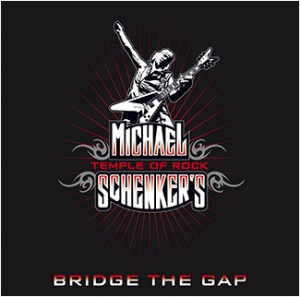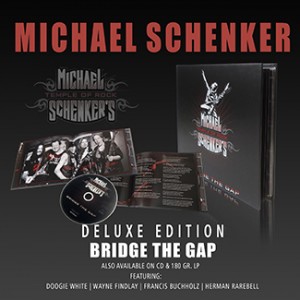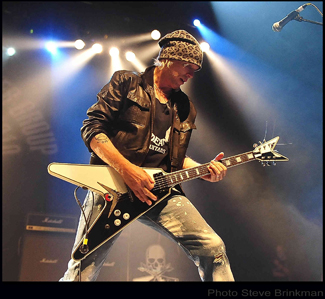Getting right to the point, the newest album by Michael Schenker’s Temple of Rock, Bridge the Gap, may be the best thing the guitarist has released since the 1980s. It’s an album that takes all the great elements of hard rock from the ’70s — when the genre seemed invincible — and puts a modern sound to it.
READ POWERLINE’s REVIEW OF BRIDGE THE GAP
The addition of vocalist Doogie White, is one of the main reasons why the Temple of Rock lineup (with Wayne Findlay on keyboards and additional guitars, Francis Buchholz on bass, and Herman Rarebell on drums) has become a great deal more powerful and energetic. Lovers of the likes of Deep Purple, Dio, and Ritchie Blackmore’s Rainbow will be very pleased. And with Schenker’s iconic heavy metal guitar sound to boot.
At the moment, Michael Schenker is on the road in America with Doogie White to test drive the new album before the Temple of Rock lineup officially begins their world tour in March. Michael answers a lot of questions about the current goings-on of the band below:
Compared to the last album (simply titled Temple of Rock), this album kicks ass right out of the box. The adrenaline is very high and it goes right for the jugular, which is when you’re at your best.
Michael Schenker: Thank you. It’s a constant development, step-by-step, moment-by-moment. I mean, how things happen, how things come together, stuff like that, you can’t plan it. I found that with Pete Way (UFO) and Herman Rarebell (Scorpions) and myself, we were just putting together a project (Temple of Rock). I decided to go in the studio myself to put out a demo and I bumped into Michael Voss (producer and vocalist). I asked him to help me out with the vocals. I said to him, “You can actually sing, why don’t you do the whole album.” So that’s how we ended up doing it. And I played it to Pete Way and Herman Rarebell and they were so impressed with it, they agreed to do the rhythm section, so I started to form the band there. Then I asked musicians from the past and I ended up with Carmen Appice, my brother (Rudolf Schenker) Paul Raymond, Chris Slade, and all these guys. I kind of thought this is really strange. I only went into the studio, making a demo, and it turned into this. And Robin McAuley was on there and Doogie White. I wrote especially for Doogie. And that particular song, “Before the Devil Knows You’re Dead,” became like an underground hit in the U.K. It sounded so good and so powerful, and, you know, by the time we finished the first Temple of Rock album, Michael Voss signed a record deal, a solo deal, so he wasn’t available for the [entire] world tour. I had to start and improvise but because I had Robin and Doogie on the album, I was able to create like three lineups. Robin McAuley was doing [a tour] in America, Michael Voss in Japan and Doogie in Europe.
 By the time we started Europe, Pete Way wasn’t doing so well and so I asked Herman to ask Francis (Buchholz, Scorpions) what he was up to. And Francis was more than happy to join. We started our European tour and the chemistry was magic. I felt like I better arrange for a video shoot ’cause who knows what’s gonna happen. I want to record the memory, so we went to a convenient place in Holland and ended up with a DVD. Better still we had to add another European tour because the request was so high. By the time we finished the first leg of the European tour and the second European tour was starting, there was a six-month gap. So I decided to ask the guys if they wanted to make an album. It was a great opportunity and everybody was happy about it. I started writing in October 2012 and I said to Doogie that I already knew the album title would be called Bridge the Gap. I said to him, “Think ‘Bridge the Gap,’ maybe for lyrical inspiration, and think melodic.” Off he went and he ended up doing a fantastic job with it. And by the end of the year we were ready to go into the studio, and by the 31st of March [2013] it was basically done. The problem was, the album wasn’t going to be out for another few months so I had to figure out what to do. I simply decided to just put it away, not listen to it or play it to anybody. Because we were [back] in touring mode, I didn’t want recording mode to interfere. The good thing about it was after we finished the second leg in 2013 around August, we listened to it and we had fresh ears and we knew immediately what we could do to improve it. We did the fine-tuning, improved it, remixed it and mastered it, added stuff to it, and so on, and it was that much better. It was like how many artists go into the studio and two months after release they say “Oh, I wish I had done it this way.” We had the opportunity. It wasn’t planned but it turned out that way. Very unusual but it was an interesting experience.
By the time we started Europe, Pete Way wasn’t doing so well and so I asked Herman to ask Francis (Buchholz, Scorpions) what he was up to. And Francis was more than happy to join. We started our European tour and the chemistry was magic. I felt like I better arrange for a video shoot ’cause who knows what’s gonna happen. I want to record the memory, so we went to a convenient place in Holland and ended up with a DVD. Better still we had to add another European tour because the request was so high. By the time we finished the first leg of the European tour and the second European tour was starting, there was a six-month gap. So I decided to ask the guys if they wanted to make an album. It was a great opportunity and everybody was happy about it. I started writing in October 2012 and I said to Doogie that I already knew the album title would be called Bridge the Gap. I said to him, “Think ‘Bridge the Gap,’ maybe for lyrical inspiration, and think melodic.” Off he went and he ended up doing a fantastic job with it. And by the end of the year we were ready to go into the studio, and by the 31st of March [2013] it was basically done. The problem was, the album wasn’t going to be out for another few months so I had to figure out what to do. I simply decided to just put it away, not listen to it or play it to anybody. Because we were [back] in touring mode, I didn’t want recording mode to interfere. The good thing about it was after we finished the second leg in 2013 around August, we listened to it and we had fresh ears and we knew immediately what we could do to improve it. We did the fine-tuning, improved it, remixed it and mastered it, added stuff to it, and so on, and it was that much better. It was like how many artists go into the studio and two months after release they say “Oh, I wish I had done it this way.” We had the opportunity. It wasn’t planned but it turned out that way. Very unusual but it was an interesting experience.
It’s interesting how life works out because Doogie seems like the perfect fit for you. Just like Gary Barden was a perfect fit for you in the ’80s and Phil Mogg in the ’70s.
Schenker: You know what the funny part is? We were in South America and Doogie and I were sitting in a van waiting to go on. I was chatting with Doogie and I said, “You know, it’s kind of weird if I look back at my past. Phil Mogg, he was a singer, and he was a Rat of the Chinese horoscope. And I’m a Horse. And then comes [Wayne] Findlay and he also is a Rat, and my brother is a Rat.” And Doogie went, “Mike, you must be joking. I am a Rat, too.” (laughs). There must be something. It seems like by the Chinese horoscope and by chemistry, it seems to be the Rat has very little of what the Horse has a lot of. And the Horse has a very little of what the Rat has a lot of. So if you combine on the creative level, you have a very wide spectrum and compliment each other. And I agree, the chemistry is fantastic. Doogie has that extra something that puts more drama to it. He has that metal voice. He has a great voice. He’s a personality. It kind of fits into what I was saying, that he has a lot of what I have a little of. And I have a lot of what he has a little of. It seems to be, in a creative way, very very fulfilling. Horses and Rats are the opposite poles, so in China they don’t marry (laughs). From a relationship point of view, maybe not the best, but creatively — and that’s what we are here for, the music — it’s fantastic.
You called the album Bridge the Gap while you pretty much nailed it. Why did you go to Doogie and say think “Bridge the Gap”? What was the reason?
Schenker: When Francis joined I kind of went “Wow. This is incredible.” We only made one album together, Lovedrive, which was the album where I had just left UFO and helped out and it opened the door for America. I was withdrawn, and it basically was like my brother took over and I entered the second stage of my life which was more on the personal level. And here it is stage three, and I’m back, celebrating my generation of rock — the generation of rock that I had when I started: Zeppelin, Deep Purple, Black Sabbath, etc. That incredible era of rock that lasted for all these years. And sooner or later it’s just gonna be memory because so many people have already passed away who are important musicians like John Bonham, Ronnie James Dio, Alvin Lee, Gary Moore, Randy Rhoads, Jon Lord, etc. So many. For me it feels like I did my musical contribution in the first part of my life. In the second part I withdrew a bit to my personal life. In the third stage it’s about celebration. To focus on what it was all about. To put this incredible era of rock to the foreground once again and celebrate it, basically. That’s what I feel like doing. So [the title] “Bridge the Gap” basically connects the past to the present. Being with Francis and Herman is the perfect example. And we have a chance to combine that traditional sound and make it deeper and put a bit of a modern touch to it. Also what’s going on in the world right now. There’s a lot of gap bridging going on. Seems like a pretty suitable title.
You’ve brought up a great point. You have nothing more to prove. Why not celebrate the music now.
Schenker: Yeah.
How do you go about writing the music with vocalists? Do they normally come to you with lyrics, or do you write the music first?
Schenker: I play on a regular basis and when I bump into something I really like, a little riff, five seconds or ten seconds, I just quickly put it on a cassette recorder and I just leave it there. And when it comes time for me to make a record, I just look at what I have and what hits me straight away I get inspired and write an additional part to it. So I have enough material to give it to the singer and he takes it and gets inspired by what he hears. [Here] I said bridge the gap and think melodic and [Doogie] did a great job. To me I felt like I was 18 again, like it was full cycle, a fresh spark, keeping it interesting, like a book, where there’s always something exciting going on.
So you already have a tour [for this album], touring America now.
Schenker: Here’s what’s happening, okay: This album’s lineup is not going to be ready until March. That’s when our world tour starts, in Japan. And here I’m doing this [tour] because the album’s release is in January, I said to everybody, look, I want to be there when the album comes out. I take Doogie and Wayne with me and we promote the album and we also announce the upcoming world tour with the album lineup in 2014. So I am taking this opportunity with the help of Rev Jones on bass and Pete Holmes on drums to introduce Doogie as the first step to the American fans and the American audience. We will start our world tour in Japan in March and then we will be coming back here with the album lineup after that world tour, in autumn.
Will it be the same kind of set list throughout then.
Schenker: No. Over here we’ll play a set list we haven’t played yet. When we start the world tour in Japan we will be playing the [old] European set list, because in Japan, they have never seen anything. Then when we do Europe again we will change the set list from then on to something completely new.
In a way that keeps it fresh. It mixes it up and it’s good for the musicians. After awhile I’m sure the same set list can get to you.
Schenker: Oh yeah, because it’s so much material I have anyway, that is still popular. We can’t put them in one set list any way. At this point in time I’m not really overexposed — I haven’t been touring like many bands — so I’m pretty preserved and my music is pretty preserved. I can juggle around things and keep it always interesting. There will always be something that someone wished for that next time around it will happen.
Fans that go to the show will wonder what UFO songs you’ll pick. They know the standards. They know what you’ll probably play but are there any songs that might surprise some fans?
Schenker: There’s lots of time and space for that. What happens is this: because I’m haven’t been overexposed right now we are iplaying the most popular music that I was involved in. That’s what’s happening, that’s what’s the most current. Michael Schenker’s Temple of Rock is in the most popular of past and present. After we finish touring for this whole album and finish maybe somewhere in the middle of 2015, I already have an idea what to do next. Write a new album, go into the studio, and build on that as we go. We will have enough extra that we can put in and put into the foreground, stuff that was not on Strangers in the Night, not on One Night at Budokan. There’s always a possibility that it will happen sooner than later, you don’t know. There’s the surprise element where maybe it’s time that something will show up.
Fans always expect to hear “Rock Bottom” and your solo in it.
Schenker: “Rock Bottom”… I can always take into another journey. I keep the basic parts that make the song, but then I can also break out of that and give little glimpses of new developments in a tasteful way. Over and over “Rock Bottom,” its fueled with new sparkles. And that’s fun doing.
After all these years, you now have a catalog of all these songs, is there a favorite song or even a favorite solo to play live?
Schenker: Well, the thing is, I am constantly developing and I have been since Lonesome Crow. I mean, it never sopped. That’s what I do. I am fascinated with it. I love to play and discover. I love discovery and make my whole life wider and understand the world better, etc, etc. I have an interest in developing personally, on a personal level, not just musically. So as we go I am locked into the moment and enjoy the moment, and make the next moment better than the last moment. That’s why I move forward and create new stuff. I go to the past but I take the past with me as highlighted memories that I will bring to the foreground and add current development to it.
It goes back to the first Scorpions album. It was the first time I was coming out of the radio where one year before it was Led Zeppelin coming out of that same radio. It was incredible, and then I went into UFO, to a British band, a young German, 17 1/2 years old and the Phenomenon album and that was the next level of development, And year after year there’s another step in development. And so there was always the moment with the current circumstances and surroundings. It always fit into that differently and how it came about. That’s why it’s difficult if I look back at things. I get excited when you can really hear the steps going forward.
It’s interesting you that mentioned Lonesome Crow. I still listen to that album from time to time. I still love that album.
Schenker: It’s unique in its own way. If you compare it to a current established musician, of course, it’s different. But the fact is that this is the source of more things to come. It’s very interesting.
You would really blow away fans if you played more Lonesome Crow songs.
Schenker: I did actually play “In Search of the Peace of Mind.” It’s the first song I ever wrote and Klaus Meine ended up writing the lyrics to it. But it’s kind of spooky. The title of the song — ”In Search of the Peace of Mind” — is exactly what I’ve been doing all my life. And we played it on the 30th Anniversary and recorded it.
By the way, is Pete Way doing better? You mentioned how he couldn’t tour.
Schenker: I was always kind of keeping an eye out on Pete one way or another throughout the years. He’s a very, very nice person and so on, you know, but somehow, at some point, there’s only so much you can do. He has to develop on his own time and he’s ready when he’s ready for what he needs to be ready for. I heard something just recently where he has some other health problem, so right now I think the best he can do is be cared for by professional people and make sure that he comes out of that vicious cycle on the health level. I think Pete Way is going the even harder way than most people but I think when he comes through it he will be an incredible person. If he makes it through everything there will be a lot that he will bring [from it].
 You seem to exclusively play Dean guitars. Do you own any others or is it just Dean?
You seem to exclusively play Dean guitars. Do you own any others or is it just Dean?
Schenker: Well, the things is I started off with my brother’s guitar and then I discovered the Flying V and because of the shape you kind of adapt to the position and the way you hold it and play and so on. You get so used to it you really don’t want to play anything else. By the time 2004-2005 or so [Dean] made me an offer and they’re very nice people and the guitar is excellent and that was it. So there’s no reason to change to other things.
Well, when you think of the Flying V guitar you think of Michael Schenker.
Schenker: I guess so, by now, you know, and it is usually black and white but I am coming up with all sorts of different designs now because it’s maybe part of my personal development — the design of the guitar, etc. It kind of speaks a little bit in a spiritual way to the people.
You say that you try to, creatively, not absorb outside influences because it keeps yourself very pure.
Schenker: With music I am like a monk. I stay away from music as much as I can, like a monk stays away from the external world. Because I focus on musical contributions to the world from a place of pure self-expression. It also keeps you fresh. I knew that from when I was 17, I had to stay away from the external influence as much as I can, you know. You can’t always completely.
You are also releasing a deluxe edition of Bridge the Gap.
Schenker: Yeah they’re releasing a special edition with some acoustic stuff that I did with Don Dokken. Don and I cross paths over and over and Don said to me “We must do something acoustic together” and so one day I had an idea and I said to him, “Hey, look, I made all these acoustic instrumental albums, pick some of songs and write something to it and see what it sounds like with vocals. He started and he did like five songs already. It sounds fantastic. So we decided to put one of the songs on one of the editions (“Faith”) for people to hear what it sounds like. And so he continuously writes so at some point we have enough together to release an album.
There’s [also] vinyl with one less song on it — because it didn’t fit time-wise. So that’s what has been done — three different ways of releasing the album.











